
The Account Watch widget allows you to view all areas of your financial (general ledger) information. It can be configured to display any account within your general ledger, including headers and computed accounts such as gross profit, net profit and operating profit for a given period. Account Watch widget can also be configured to display information relating to branch, sub-branch or GL department.
Periods include days, weeks, months, quarters, etc. The widget will display results which can be compared to the same/different account over the same/previous period.
An extremely powerful feature of the Account Watch widget is the MAT function. MAT stands for Moving Average Total. When looking at a year of information, this is also known as Moving Annual Total.
Click Configure to open the account watch widget Options screen.
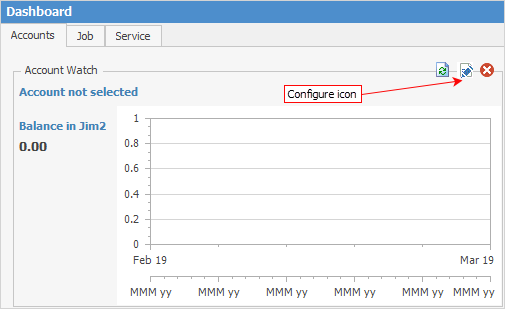
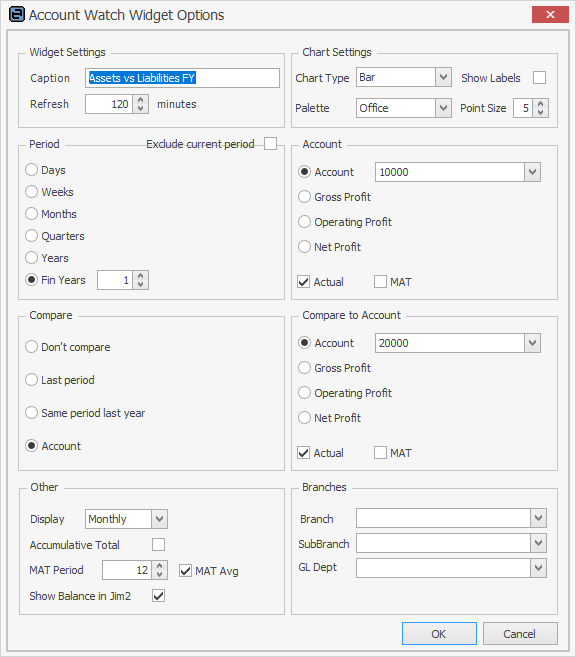
Explanation of fields
Group |
Option |
Description |
|---|---|---|
Widget Settings |
Caption |
This is the caption that will be displayed at the top of the widget. Example: Assets vs Liabilities FY (financial year). |
Refresh |
The widget's refresh interval in minutes. It is suggested not to set this too low, eg. set to 15 minutes or higher. |
|
Chart Settings |
Chart Type |
Choose from:
Bar  Line Line Area Area |
Show Labels |
Shows description and value above each point of the chart. If not ticked, the label will be displayed as a hint when your mouse is over a graph point. |
|
Palette |
Select the colour palette that will be used in the graph. |
|
Point Size |
The size of the graph's points. Default = 2. Try 8 or 10 on smaller graphs.
2 points:  10 points:  |
|
Period |
Days |
Default is 365. Use up/down arrows to change number of days. |
Weeks |
Default is 1. Use up/down arrows to change number of weeks. |
|
Months |
Default is 3. Use up/down arrows to change months. |
|
Quarters |
Default is 1. Use up/down arrows to change quarters. |
|
Years |
Default is 1. Use up/down arrows to change calendar years. |
|
Fin Years |
Default is 1. Use up/down arrows to change financial years. |
|
Exclude current period |
Tick to exclude the current period from any results for a chosen period, eg. if Months is set to 1 and this box is not ticked, the current month will be shown. If it is ticked, the previous month will be shown |
|
Account |
Account |
Display the selected general ledger account as the graph's first series of data. |
Gross Profit |
Display gross profit as the graph's first series of data. |
|
Operating Profit |
Display operating profit as the graph's first series of data. |
|
Net Profit |
Display net profit as the graph's first series of data. |
|
Actual |
Tick to display the actual (real) account figures. |
|
MAT |
Tick to display the MAT (using MAT options below) account figures. |
|
Compare |
Don't Compare |
Display only the graph's first series of data. |
Last Period |
Compare to data from last period. Example: If Period = This Month, comparison = Last Month. |
|
Same Period Last Year |
Compare to data from same period last year. Example: If period = this month, comparison = last month. |
|
Account |
Compare to data from a different general ledger account. |
|
Compare to Account |
Account |
Compare against the selected general ledger account. |
Gross Profit |
Compare against gross profit. |
|
Operating Profit |
Compare against operating profit. |
|
Net Profit |
Compare against net profit. |
|
Actual |
Tick to display the actual (real) account figures in the comparison. |
|
MAT |
Tick to display the MAT (using MAT options below) account figures in the comparison. |
|
Other |
Display |
Group and display data by selection: daily, weekly, monthly or quarterly. |
Accumulative Total |
Display data as an accumulative total. Example: when displaying a P&L account, the data will start at zero and will be added together for the period selected. |
|
MAT Period |
The number of periods used in MAT calculations. Example: when displayed by months, 3 would be the total of the current month and the previous two months. |
|
MAT Avg |
Display MAT as an average (rather than a total). Example: 50 + 100 + 60 = 210 and then 210÷3 = 70 |
|
Show Balance in Jim2 |
Displays the balance of the selected account, or the gross profit, operating profit or net profit (whichever of these has been selected in account options). |
|
Branches |
Branch |
Filter P&L account data by a specific branch. |
SubBranch |
Filter P&L account data by a specific sub-branch. |
|
GL Dept |
Filter P&L account data by a specific GL department. |
What to Look at
You can add and configure multiple Account Watch widgets to see your entire financial position, along with trends. It is suggested that you configure several dashboard tabs to cover the various financial aspects of your business.
Where is This Information Coming From?
All data displayed in the Account Watch widget comes directly from your transaction journal. Any information within the widget can be compared directly to information displayed within your profit & loss and balance sheets. Any general ledger account, including headers and computed accounts, such as net profit, can be selected and displayed.
Some Suggestions
Sales and Profit
Try comparing a stock GL group's income account versus its COGS account. Or total income (header account 4-0000) versus expenses (header account 6-0000).
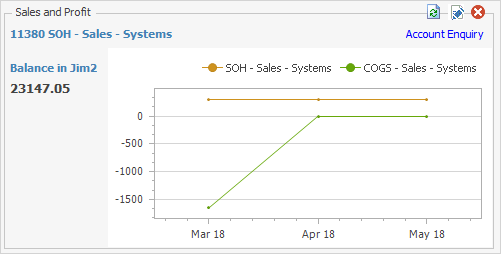
Profit and Loss
Compare your gross profit versus net profit, or your net profit this year compared to last.
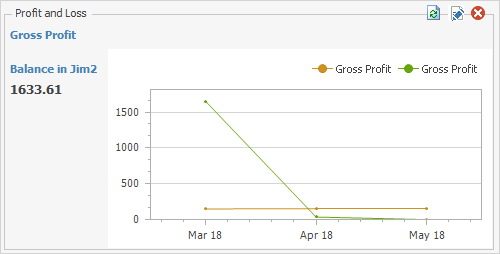
Assets and Liabilities
Try viewing your current bank balance or your cash assets (all bank accounts and unbanked funds) over a given period.
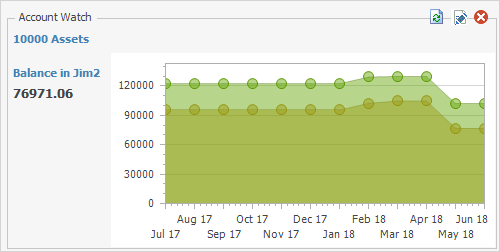
Keep an eye on your GST and tax liabilities.
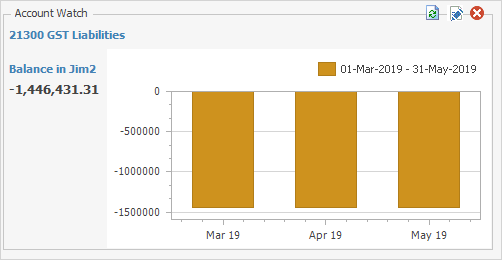
Monitor your SOH (stock on hand) figures for this year versus same period last year.
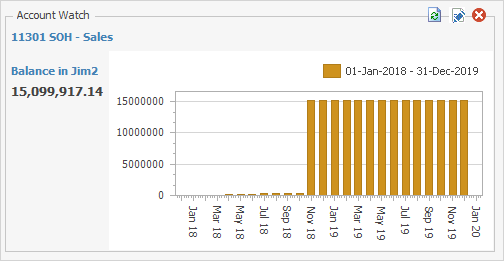
Depending on your type of business, when looking for trends you would normally look at data over a year. In this case try setting the period to Fin Year = 1 or Days = 365.
The Moving Average Total (MAT) feature is particularly useful here. For example, try displaying a profit account and tick both Actual and MAT. In the Other section of Options, set Display to Monthly, the MAT period to 3 and tick MAT Avg.
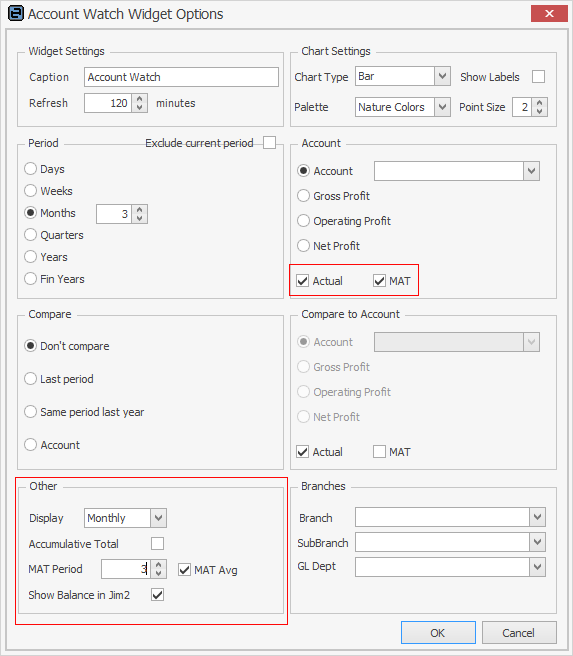
The widget will now show a year's worth of data, displayed monthly, along with a three month MAT.
MAT is an extremely powerful method that looks for trends by smoothing out the highs and lows and displaying a rolling average. This makes it easier to compare performance, especially to previous periods.
Chart Types and Palettes
Try changing chart types to match the type of data you are looking at. It's amazing how some data looks better when displayed as an Area chart rather than a Bar chart, or vice versa.

Use palettes to make your widgets more distinctive, eg. Office for profit & loss, or Nature for balance sheet.
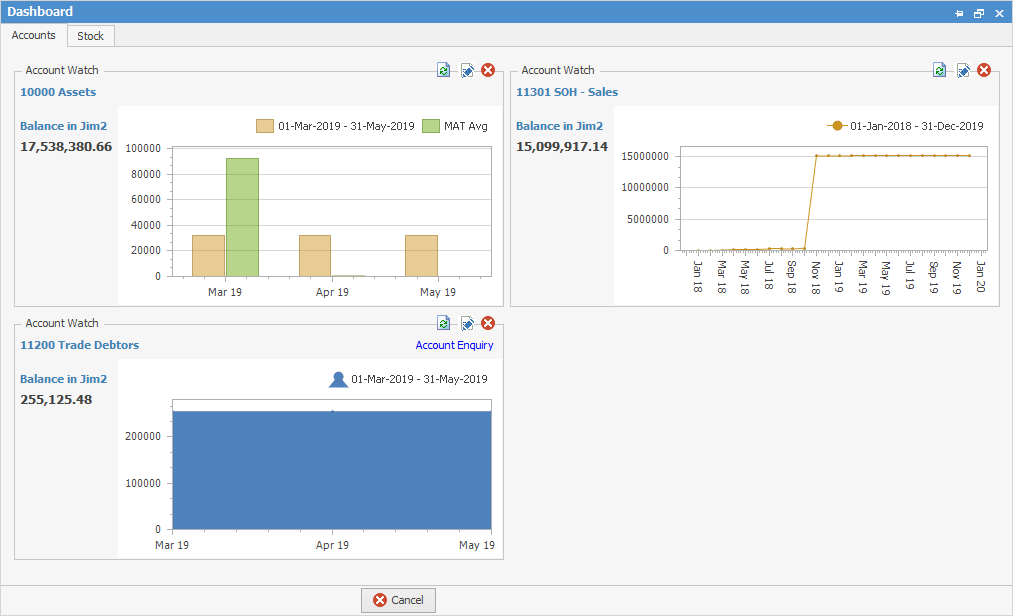
Further information: